Hyundai Bayon vs Peugeot 308 SW – Differences & prices compared
Compare performance, boot space, consumption and price in one view.
Find out now: which car is the better choice for you – Hyundai Bayon or Peugeot 308 SW?
The Hyundai Bayon (SUV) comes with a Petrol engine and Manuel or Automatic transmission. In comparison, the Peugeot 308 SW (Estate) features a Diesel, Electric, Petrol MHEV or Plugin Hybrid engine with Automatic transmission.
When it comes to boot capacity, the Hyundai Bayon offers 411 L, while the Peugeot 308 SW provides 608 L – depending on how much space you need. If you’re looking for more power, decide whether the 100 HP of the Hyundai Bayon or the 195 HP of the Peugeot 308 SW suits your needs better.
In terms of consumption, the values are 5.40 L per 100 km for the Hyundai Bayon, and 15.30 kWh0.80 L for the Peugeot 308 SW.
Price-wise, the Hyundai Bayon starts at 20100 £, while the Peugeot 308 SW is available from 29500 £. Compare all the details and find out which model fits your lifestyle best!
Hyundai Bayon
The Hyundai Bayon is a compact crossover that effortlessly merges practicality with modern design. Its sleek exterior and spacious interior make it an ideal choice for urban settings and longer journeys alike. With a focus on comfort and connectivity, this vehicle provides a smooth driving experience paired with advanced technology features.
details @ hyundai.news
@ hyundai.news
 @ hyundai.news
@ hyundai.news
 @ hyundai.news
@ hyundai.news
 @ hyundai.news
@ hyundai.news
 @ hyundai.news
@ hyundai.news
Peugeot 308 SW
The Peugeot 308 SW impresses with its stylish design and practical nature, making it a standout in the estate car category. Its spacious interior is complemented by a high-quality finish, offering comfort for both the driver and passengers. The vehicle also boasts advanced technology features, ensuring a modern and enjoyable driving experience.
details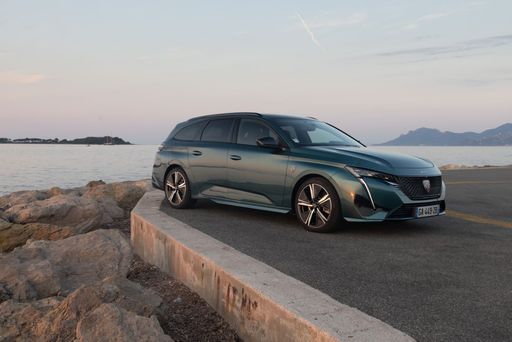 @ media.stellantis.com
@ media.stellantis.com
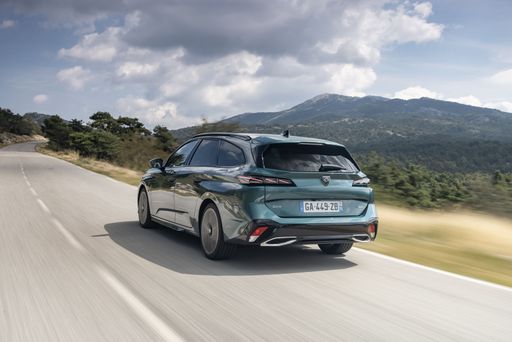 @ media.stellantis.com
@ media.stellantis.com
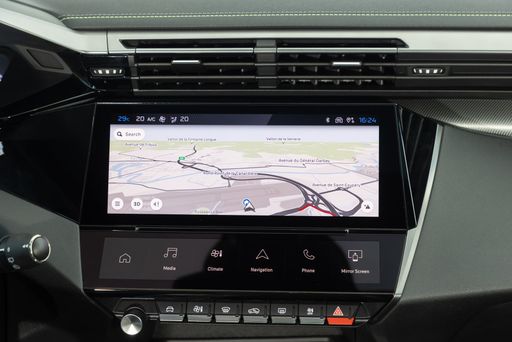 @ media.stellantis.com
@ media.stellantis.com
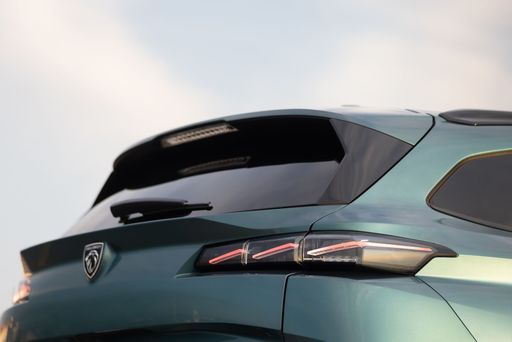 @ media.stellantis.com
@ media.stellantis.com
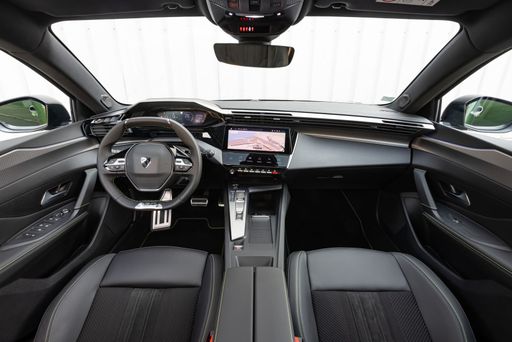 @ media.stellantis.com
@ media.stellantis.com

|

|
|
|
|
Costs and Consumption |
|
|---|---|
|
Price
20100 - 25800 £
|
Price
29500 - 42600 £
|
|
Consumption L/100km
5.4 - 5.5 L
|
Consumption L/100km
0.8 - 5.1 L
|
|
Consumption kWh/100km
-
|
Consumption kWh/100km
15.30 kWh
|
|
Electric Range
-
|
Electric Range
78 - 410 km
|
|
Battery Capacity
-
|
Battery Capacity
51 kWh
|
|
co2
124 g/km
|
co2
0 - 134 g/km
|
|
Fuel tank capacity
40 L
|
Fuel tank capacity
42 - 53 L
|
Dimensions and Body |
|
|---|---|
|
Body Type
SUV
|
Body Type
Estate
|
|
Seats
5
|
Seats
5
|
|
Doors
5
|
Doors
5
|
|
Curb weight
1170 - 1195 kg
|
Curb weight
1475 - 1791 kg
|
|
Trunk capacity
411 L
|
Trunk capacity
467 - 608 L
|
|
Length
4180 mm
|
Length
4636 mm
|
|
Width
1775 mm
|
Width
1852 mm
|
|
Height
1500 mm
|
Height
1442 mm
|
|
Payload
460 - 465 kg
|
Payload
409 - 500 kg
|
Engine and Performance |
|
|---|---|
|
Engine Type
Petrol
|
Engine Type
Diesel, Electric, Petrol MHEV, Plugin Hybrid
|
|
Transmission
Manuel, Automatic
|
Transmission
Automatic
|
|
Transmission Detail
Manual Gearbox, Dual-Clutch Automatic
|
Transmission Detail
Automatic Gearbox, Dual-Clutch Automatic, Reduction Gearbox
|
|
Drive Type
Front-Wheel Drive
|
Drive Type
Front-Wheel Drive
|
|
Power HP
100 HP
|
Power HP
130 - 195 HP
|
|
Acceleration 0-100km/h
11.3 - 12.4 s
|
Acceleration 0-100km/h
7.7 - 10.9 s
|
|
Max Speed
176 - 179 km/h
|
Max Speed
170 - 225 km/h
|
|
Torque
172 - 200 Nm
|
Torque
230 - 300 Nm
|
|
Number of Cylinders
3
|
Number of Cylinders
3 - 4
|
|
Power kW
74 kW
|
Power kW
96 - 144 kW
|
|
Engine capacity
998 cm3
|
Engine capacity
1199 - 1598 cm3
|
General |
|
|---|---|
|
Model Year
2024
|
Model Year
2023 - 2025
|
|
CO2 Efficiency Class
D
|
CO2 Efficiency Class
D, A, C, B
|
|
Brand
Hyundai
|
Brand
Peugeot
|
Hyundai Bayon
Introducing the Hyundai Bayon: A New Era in Compact SUVs
The Hyundai Bayon, a compact SUV designed with urban adventurers in mind, is making waves with its exceptional blend of style, performance, and technology. The brand has pulled out all the stops to ensure that the Bayon stands out in the crowded SUV market, offering a vehicle that is both practical and innovative.
Sleek Design and Cutting-Edge Aerodynamics
The Bayon features a striking exterior design, characterised by its bold lines and angular shapes. With a length of 4180 mm, a width of 1775 mm, and a height of 1500 mm, the Bayon commands attention with its modern appeal and aerodynamic efficiency. These dimensions not only contribute to its sleek design but also enhance fuel efficiency, achieving an impressive 5.4 L/100 km.
Engine Performance and Specifications
Under the bonnet, the Bayon is powered by a 1.0-litre T-GDI petrol engine, delivering a robust 100 PS or 74 kW. This engine is available with either a manual or automatic gearbox, meeting varied driver preferences. The front-wheel-drive system complements its urban-centric design, ensuring a smooth and responsive ride.
Maximised Interior Space and Comfort
The spacious interior of the Bayon accommodates up to five passengers comfortably. The vehicle boasts a boot space of 411 litres, perfect for both everyday use and weekend getaways. The cabin is designed with practicality and technology in mind, with intuitive controls and ample storage options.
Advanced Technology and Connectivity
Hyundai has equipped the Bayon with state-of-the-art technology to enhance the driving experience. The SUV features a high-resolution touchscreen, offering seamless connectivity with Apple CarPlay and Android Auto. Safety is also a priority, with multiple driver assistance systems including lane-keeping assist and forward collision avoidance assist.
Environmental Efficiency
Despite its powerful performance, the Bayon achieves a respectable CO2 efficiency class of D, with emissions as low as 122 g/km. This balance between performance and environmental responsibility makes the Bayon an attractive option for conscientious drivers.
Affordability and Market Appeal
The Hyundai Bayon is competitively priced, ranging from €22,900 to €29,600. Its affordable running costs, estimated at 32.3 to 36.4 cents per kilometre, further enhance its appeal to budget-conscious consumers. With monthly costs ranging from €806 to €909, the Bayon provides excellent value without compromising on features or performance.
Final Thoughts
The Hyundai Bayon truly stands out in the compact SUV segment, combining style, innovation, and practicality in an appealing package. It offers a versatile driving experience suited to the demands of modern urban living, making it a top contender in its class. As Hyundai continues to champion forward-thinking design and technology, the Bayon is a testament to the company's ongoing commitment to excellence.
Peugeot 308 SW
Introducing the Peugeot 308 SW: A Harmony of Style and Innovation
The Peugeot 308 SW is not just another estate car; it's a blend of sophisticated design and cutting-edge technology that offers something for every driver. Whether you're looking for fuel efficiency, dynamic performance, or state-of-the-art features, the Peugeot 308 SW stands out in the competitive market of family cars.
Performance Meets Efficiency
Under the bonnet, the Peugeot 308 SW comes with a range of engine options to suit varied preferences. The model offers petrol mild-hybrids, diesels, pure petrol, and even plug-in hybrids, ensuring efficient performance with a range between 130 to 225 PS. For those inclined towards green energy, the all-electric variant provides a dynamic driving experience with zero emissions.
The plug-in hybrid versions boast an impressive fuel consumption of 1.3 L/100km, providing a seamless union of electrical efficiency and conventional horsepower. On the other hand, the all-electric model achieves a consumption of 15.7 kWh/100km, with an electric range of up to 410 km.
Technological Prowess
Step inside the Peugeot 308 SW, and you'll find a cabin that is as functional as it is stylish. The model comes with Peugeot’s latest i-Cockpit® technology, featuring a compact steering wheel and a large 10-inch touchscreen, making driving intuitive and comfortable. With an acceleration of 0-100 km/h in just 7.6 seconds in its top-tier models, you have a car that is responsive yet efficient.
The car is equipped with advanced driver-assistance systems that ensure a safer driving experience. Features like adaptive cruise control and lane-keep assist are standard across various trims, enhancing the overall safety quotient.
Design and Comfort
The Peugeot 308 SW's exterior design presents a dynamic yet elegant silhouette, perfectly capturing its dual nature of performance and comfort. With a length of 4636 mm and width of 1852 mm, it offers spacious interiors without compromising on style. The boot space ranges from 548 to 608 litres, providing ample storage for family trips.
Inside, passengers enjoy a plush experience with high-quality materials and state-of-the-art connectivity options. The car offers a choice of premium upholstery and sophisticated trims, ensuring comfort wherever your journey takes you.
Conclusion: The Ideal Family Car
The Peugeot 308 SW is more than just a car; it's a statement. With pricing starting from €30,150 to €48,440, it offers incredible value for money. The car’s diverse range of drivetrain options and technologically rich features make it a perfect companion for families seeking versatility and innovation in one package.
Whether it's the allure of electric power or the reliability of a petrol engine, the Peugeot 308 SW offers options that align with modern-day driving needs, proving that you really can have it all in an estate vehicle.
Which drive types are available for the Hyundai Bayon?
Available as Front-Wheel Drive.
The prices and data displayed are estimates based on German list prices and may vary by country. This information is not legally binding.
